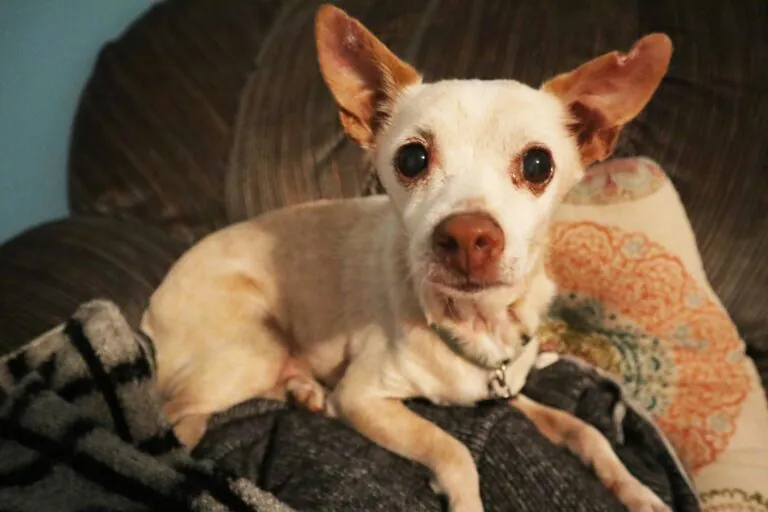In the realm of canine companions, small dogs often steal the show with their adorable size and mighty personalities. Yet, keeping these tiny titans at a healthy weight can be a formidable challenge. This is especially true considering how easy it is to overfeed these pint-sized pets, unknowingly leading to potential health risks such as obesity. To aid in this endeavor, this informative piece “Tiny But Mighty: Tips for Keeping Small Dogs at a Healthy Weight” comes packed with valuable insights.}

In the following sections, expect to uncover a treasure trove of knowledge, from understanding the ideal weight ranges for various small dog breeds to recognizing the signs of an overweight pet. Dive into practical advice on maintaining a balanced diet, introducing regular exercise into your pet’s routine, and the importance of regular vet check-ups. There’s also a bounty of advice on portion control, along with tips on how to resist those puppy dog eyes begging for table scraps.
Adopting a small dog comes with a responsibility to protect and promote their health, and weight management plays a crucial role in that journey. Whether you’re a first-time small dog owner or a seasoned pet parent, this comprehensive guide aims to arm you with the right tools to ensure your tiny but mighty friend thrives at a healthy weight. Stay tuned for an engaging exploration into the world of small dog weight management.
Choosing the Right Food for Your Small Dog
When selecting food for your small dog, it is important to look beyond brand reputation or advertising. Focus instead on nutritional value, ingredient quality, and how the food meets your dog’s specific needs. Small breeds often have faster metabolisms, so they require energy-dense food that offers balanced nutrition without unnecessary fillers.
Opt for dog foods formulated specifically for small breeds, as these often contain the right balance of nutrients in appropriately sized kibble. Check the label for whole food ingredients like chicken, lamb, or salmon at the top of the list. Avoid foods where corn, wheat, or soy are the main ingredients, as these can contribute to weight gain without providing much nutritional benefit.
Specialized formulas that support joint health, dental care, or weight control can also be beneficial depending on your dog’s needs. Brands that include omega-3 fatty acids, glucosamine, and chondroitin offer added support for overall health, particularly as your dog ages.
Implementing a Feeding Schedule
Creating a consistent feeding schedule is one of the best strategies for managing your small dog’s weight. Regular meal times help regulate metabolism and maintain stable blood sugar levels throughout the day.
Feed your dog two to three small meals daily rather than one large meal. This approach prevents overeating and supports digestion. Using a measuring cup ensures that you deliver the correct amount of food every time. If you are unsure about the right portion size, consult your veterinarian for tailored advice based on your dog’s age, weight, and activity level.
Feeding on a schedule also helps establish a routine, making it easier to identify any changes in appetite that might signal health issues. Always provide fresh water alongside meals to encourage proper hydration.
Understanding the Role of Treats
While treats are a valuable training aid and a way to bond with your pet, they should be used wisely. Treats can quickly add excessive calories to your dog’s diet if not monitored carefully.
Choose low-calorie, healthy treats made with natural ingredients. You can also use small pieces of fruits like apples (without seeds) or vegetables like carrots as healthy alternatives. Treats should never account for more than 10% of your dog’s daily caloric intake.
Instead of using treats as a default reward, mix in praise, toys, or playtime as alternative positive reinforcements. Being mindful of treat quantity and quality helps maintain your dog’s healthy weight without depriving them of rewards.
Monitoring Your Dog’s Weight at Home
Regular weight monitoring at home is an essential part of managing your small dog’s health. Sudden weight changes can indicate a variety of health issues, from overeating to underlying medical problems.
Weigh your dog monthly using a small pet scale or by holding your dog while you stand on a human scale, then subtracting your own weight. Keep a written record of the weight to track trends over time.
In addition to using a scale, assess your dog’s body condition visually and by touch. A healthy dog will have a visible waistline when viewed from above and a slight abdominal tuck when viewed from the side. You should be able to feel but not see the ribs easily under a thin layer of fat.
Encouraging Daily Physical Activity
Small dogs might not need the same distance of walks as large breeds, but they still require daily physical activity to stay healthy and fit. Lack of exercise can lead to obesity, behavioral problems, and even joint stiffness.
Aim for at least 30 minutes of exercise daily, broken into shorter sessions if necessary. Activities like brisk walks, tug-of-war, hide-and-seek games, and interactive toys can stimulate both body and mind.
For older dogs or those with mobility issues, swimming is an excellent low-impact exercise that builds muscle strength without straining the joints. Always adapt the exercise intensity and duration to your dog’s age, breed, and physical capabilities.
Social and Mental Stimulation
Mental stimulation is just as important as physical exercise in preventing unhealthy weight gain. Bored dogs are more likely to engage in emotional eating or lazy behavior.
Interactive toys, puzzle feeders, obedience training, and scent work games offer excellent mental challenges. These activities encourage movement while simultaneously keeping your dog mentally sharp and entertained.
Enrolling in agility or obedience classes tailored for small dogs provides both physical exercise and an opportunity for socialization, which benefits emotional well-being.
Identifying Risk Factors for Weight Gain
Several factors can make a small dog more prone to weight gain. Recognizing these risks early allows you to take proactive steps to prevent obesity.
Breed predisposition plays a role, with certain breeds like Pugs, Dachshunds, and Cavalier King Charles Spaniels more likely to struggle with weight. Neutered or spayed dogs often experience a reduction in metabolism, requiring careful calorie management.
Age is another significant factor. As dogs age, they typically become less active, and their caloric needs decrease. Adjusting portion sizes and exercise routines based on life stage helps accommodate these natural changes.
Medical conditions like hypothyroidism or Cushing’s disease can also cause unexplained weight gain. If your dog gains weight despite a controlled diet and regular exercise, consult your veterinarian for screening.
Transitioning to Weight Management Diets
If your small dog is overweight or obese, your veterinarian might recommend transitioning to a weight management diet. These diets are formulated to provide balanced nutrition with fewer calories and more fiber to promote satiety.
Transition gradually by mixing increasing amounts of the new food with the old over a period of seven to ten days. Sudden changes in diet can upset your dog’s digestive system and cause refusal to eat.
Monitor your dog’s response closely during the transition. A successful switch can lead to gradual, sustainable weight loss without nutritional deficiencies or emotional distress.
Importance of Veterinary Support
Working closely with your veterinarian ensures that your small dog’s weight management plan is safe and effective. Regular veterinary visits provide opportunities for professional weight checks, nutritional counseling, and early detection of potential health problems.
Your vet may recommend specific diagnostic tests if unexplained weight changes occur. Bloodwork, urinalysis, or hormone panels can reveal underlying metabolic disorders that require medical treatment.
If necessary, your veterinarian may refer you to a veterinary nutritionist for personalized diet plans, especially for dogs with complex health needs.
Avoiding Common Mistakes
Weight management requires discipline, and some common mistakes can sabotage your efforts without realizing it.
Allowing free-feeding, giving too many treats, providing table scraps, or misjudging portion sizes are all typical pitfalls. Inconsistent routines, lack of exercise, and ignoring slow weight gain are also detrimental.
Commit to structured meal times, planned exercise sessions, and accurate monitoring. Educate all family members and caregivers about your dog’s diet plan to maintain consistency.
Consistency, patience, and vigilance are key to successfully managing your small dog’s weight long-term.
Choosing the Right Food for Your Small Dog
When it comes to feeding your small dog, it’s not just about the quantity, but also the quality of food.

Size-Appropriate Kibble
Small dogs have smaller mouths and teeth, which can make chewing larger kibble difficult. Size-appropriate kibble can make eating easier and more enjoyable for your small dog, which can also help with portion control and maintaining a healthy weight.
High-Quality Ingredients
Ensure the dog food you choose contains high-quality ingredients. Look for whole, natural ingredients and avoid foods with artificial colors, flavors, or preservatives. Foods with meat as the first ingredient are often a good choice as they typically contain more protein.
Implementing a Feeding Schedule
Just like humans, dogs benefit from regular meal times.
Consistent Meal Times
Having a set feeding schedule can help control your dog’s caloric intake and prevent overeating. It can also help with digestion and maintain stable energy levels throughout the day.
Portion Control
While it might be tempting to give your small dog extra food, especially when they give you those adorable puppy eyes, overfeeding can quickly lead to weight gain. Use a measuring cup or a food scale to ensure your dog is getting the right amount of food.
Exercise and Weight Management
Diet isn’t the only factor that affects your small dog’s weight. Regular physical activity is equally important.
Regular Exercise
Regular exercise can help your small dog maintain a healthy weight by burning calories and building muscle mass. This can include daily walks, playtime in the yard, or even indoor activities like fetch.
Weight Monitoring
Monitoring your dog’s weight can help you notice any changes that might indicate a problem. Regular weigh-ins can help you adjust your dog’s diet or exercise routine as needed to maintain a healthy weight.
Consulting with a Veterinarian
When it comes to your small dog’s diet and weight, it’s always a good idea to consult with a veterinarian.
Regular Check-ups
Regular check-ups can help your veterinarian monitor your dog’s weight and overall health. They can also provide personalized advice based on your dog’s breed, age, and health status.
Dietary Recommendations
Your veterinarian can provide specific dietary recommendations for your small dog. This can include advice on the type of food, portion sizes, and feeding schedules. They can also recommend supplements if necessary to ensure your dog is getting all the necessary nutrients.
Final Thoughts
While small dogs might be tiny, their nutritional needs are mighty. Understanding these needs and providing a balanced diet can help your small dog maintain a healthy weight and live a long, happy life. Remember, each dog is unique, so what works for one might not work for another. Always consult with your veterinarian to ensure you’re making the best choices for your furry friend.
Conclusion
In summary, maintaining a healthy weight in small dogs can be a challenging yet rewarding journey. Ensuring your tiny but mighty friend’s health will require a mix of balanced nutrition, regular exercise, and routine health check-ups. Starting with a proper diet, providing them with high-quality dog food rich in proteins and low in fats is critical. Incorporating fruits and vegetables into their diet can provide them with necessary vitamins and minerals while also promoting weight control.
Moreover, physical activities like daily walks, playtimes, and exercises are equally crucial. They not only keep your pup’s weight in check but also stimulate their mental health. Routine health check-ups with the vet are also essential to monitor their weight progress and to prevent any potential health risks.
Finally, remember that every dog is unique. What works for one might not work for another. It’s essential to understand your dog’s specific needs and adjust their diet and exercise routines accordingly. While keeping your small dogs at a healthy weight might require some effort and dedication, the resulting happy, energetic, and long-living companion makes it all worthwhile.🐾



